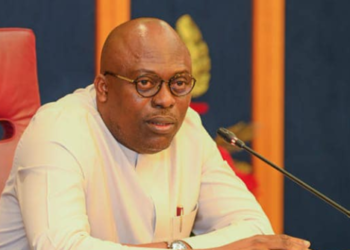Labour unions, on Wednesday, lambasted the Federal Government for slashing the supplementary budgetary allocation for wage awards to federal civil servants by N100bn, warning that this was not the agreement they had with the government.
Data obtained from the newly Revised 2023 Supplementary Budget, indicated that the government swapped the controversial N5bn presidential yacht votes for Navy barges, increased the budget for defence from N476.54bn to N546.21bn and earmarked N20bn as capital supplementation for the National Intelligence Agency.
Recall that the recently approved N2.1tn 2023 Supplementary Budget was marred with controversy following the discovery of seemingly extravagant items, forcing an amendment by the National Assembly.

In the proposed document, the four-month wage award was to cost the Federal Government around N210bn. However, the approved and newly revised document showed that it would now cost the Federal Government about N110bn.
Also in the revised budget, the Ministry of Defence budget rose from N476.54bn to N546.21bn, indicating an additional allocation of N69.67bn.
Under the ministry, the Nigerian Navy, which was earlier caught up in the controversial N5.095bn for the purchase of a presidential yacht, got an additional N25bn to its total allocation.
Its total allocation rose from N62.8bn in the proposed supplementary budget to N87.8bn in the approved document.
It also observed that the presidential yacht was replaced by the purchase of a self-propelled barge with the same amount of N5.095bn. Self-propelled barges are cargo-carrying vessels specifically engineered for operation on inland waterways.
The Nigerian Navy also got extra allocation for the construction of two buildings in Enugu and Ebonyi worth N3bn each.
About N19bn was also allocated for the purchase of two tugboats, which are used to pull or push other large ships for manoeuvring or salvage purposes.
The Defence Intelligence Agency got an extra N30bn to its total allocation, from N17.04bn in the proposed document to N47.04bn in the approved copy.
The PUNCH further observed that allocations to the Office of the National Security Adviser, headed by Nuhu Ribadu, increased by N20.3bn from N29.7bn to N50.02bn.
Similarly, the purchase of official vehicles for the office of the First Lady valued at N1.5bn remained in the budget, while the education loan fund for funding student loans was increased to N10bn from N5.5bn previously allotted.
Recall that the Federal Government, as part of steps to assuage labour unions, had granted a wage award of N35,000 to all Federal Government workers “beginning from September pending when a new national minimum wage is expected to have been signed into law.”
President Bola Tinubu had declared during his Independence Day speech that “low-grade workers” in the federal civil service would be awarded a wage of N25,000.
The amount was then increased to N35,000 following discussions with the organised labour unions. However, civil servants received a single payment of N35,000 for September only and not for two months as promised.
It is still unknown why the Federal Government decided to slash the allocation of wage awards for federal workers, but the Nigeria Labour Congress and the Trade Union Congress warned that this would be resisted.
NLC, TUC warns govt
Commenting on the development, the Assistant General Secretary, Nigeria Labour Congress, Chris Onyeka, said the agreement was for the government to raise the wages of federal civil servants and not to reduce them.
He said, “Are you saying they cut down the wage awards by N100bn? Well, we have been talking about the high cost of governance and if they decided to reduce their bills by cutting down their numerous aides and assistants, that’s alright.
“But if it is that they don’t want to pay workers what they are supposed to pay, then there is a problem. How can you subject workers to further reductions in their salaries? No way! We agreed to a wage award of N35,000 to all federal workers, so the wage award has to increase.”
Also speaking, the Head of Information, NLC, Benson Upah, said, “We were not informed before this was done. However, this behaviour is not inconsistent with the psychology of this government. It’s sad!”
The Trade Union Congress warned the Federal Government against playing games with the wage award for Nigerian workers.
The National Deputy President, TUC, Tommy Etim, said, “The government cannot play games with the wage award because it was an agreement reached with the organised labour and the instrument of agreement reached was deposited in the court.
“The government is the manager of funds and our business is to ensure compliance to the agreement is reached.”
Efforts to get the Presidency to speak on why the award was reduced were unsuccessful, as officials contacted at the villa could not provide any explanation at the time of filing this report.
Tinubu had during his Independence Day speech assured Nigerians that low-grade workers in the federal civil service would be awarded a provisional wage increase of N25,000 for the next six months.
The amount was then increased to N35,000 following discussions with organised labour organisations, as this led to an increase of the wage bill to N315bn.
The agreements made the organised labour suspend its proposed nationwide strike for 30 days, following the signing of a Memorandum of Understanding with the Federal Government.
But the NLC President, Joe Ajaero, had added a caveat that the unions would revisit the agreement if the Federal Government failed to fulfil their demands.
It was earlier reported that civil servants under the Consolidated Public Service Salary Structure received a single payment of N35,000 for September only and not for two months as promised.
“Yes, I did receive it. I saw the alert about 15 minutes ago. I think it is for September because the alert indicated September,” a civil servant, who spoke on condition of anonymity, had confirmed last month.
Another civil servant had said, “Yes, I have seen mine too but we are expecting to see another alert because the President said it would start from September. So maybe another one will come, which will read October.”
With the accelerating inflation rate in Nigeria, workers had urged the Federal Government to give them fair compensation at the time it planned to review the minimum wage in Nigeria.
Workers lamented that the escalating inflationary pressures were taking a serious toll on their finances, eroding their purchasing power.
A civil servant, who identified himself as Opeyemi, said the economic situation was becoming unbearable because most of the prices of food in the market had increased.
He claimed the amount he spent weekly on transport fares to the office had tripled.
He noted that though the Lagos State Government had promised some palliatives, he was not sure if other workers in other states were receiving that also.









